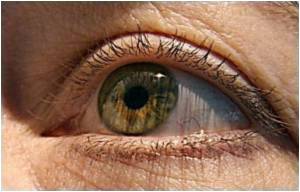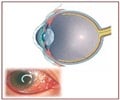Biosynthetic corneas can help regenerate and repair damaged eye tissue and improve vision in humans, a new study from researchers in Canada and Sweden has shown.

"This study is important because it is the first to show that an artificially fabricated cornea can integrate with the human eye and stimulate regeneration," said senior author Dr. May Griffith of the Ottawa Hospital Research Institute, the University of Ottawa and Linköping University. "With further research, this approach could help restore sight to millions of people who are waiting for a donated human cornea for transplantation."
The cornea is a thin transparent layer of collagen and cells that acts as a window into the eyeball. It must be completely transparent to allow the light to enter and it also helps with focus. Globally, diseases that lead to clouding of the cornea represent the most common cause of blindness. More than a decade ago, Dr. Griffith and her colleagues began developing biosynthetic corneas in Ottawa, Canada, using collagen produced in the laboratory and moulded into the shape of a cornea. After extensive laboratory testing, Dr. Griffith began collaborating with Dr. Per Fagerholm, an eye surgeon at Linköping University in Sweden, to provide the first-in-human experience with biosynthetic cornea implantation.
Together, they initiated a clinical trial in 10 Swedish patients with advanced keratoconus or central corneal scarring. Each patient underwent surgery on one eye to remove damaged corneal tissue and replace it with the biosynthetic cornea, made from synthetically cross-linked recombinant human collagen. Over two years of follow-up, the researchers observed that cells and nerves from the patients' own corneas had grown into the implant, resulting in a "regenerated" cornea that resembled normal, healthy tissue. Patients did not experience any rejection reaction or require long-term immune suppression, which are serious side effects associated with the use of human donor tissue. The biosynthetic corneas also became sensitive to touch and began producing normal tears to keep the eye oxygenated. Vision improved in six of the ten patients, and after contact lens fitting, vision was comparable to conventional corneal transplantation with human donor tissue.
Source-Eurekalert














